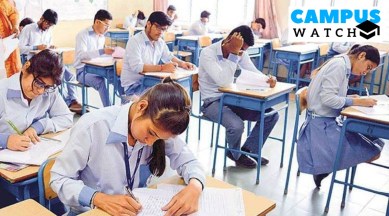Campus watch: Maharashtra’s poor science, maths scorecard prompts call for pedagogy reworking
While educationists say the latest National Achievement Survey report should serve as a wake-up call for teachers and policymakers, a teachers association leader blames the no-detention policy under the Right to Education Act for the poor showing.

The results of the National Achievement Survey (NAS) 2021 released by the education ministry on May 25 have thrown up shocking results for Maharashtra—secondary school students of the state did not achieve even the basic learning outcomes, especially in science and mathematics.
The survey conducted in November 2021 shows nearly one in three students in secondary school (Classes 8-10) in the state cannot even answer basic science and mathematics questions and the performance gets worse as the students reach higher classes.
monthly limit of free stories.
with an Express account.
Previous assessment surveys too had pointed to a similar trend and educationists across the board said the latest NAS report should serve as a wake-up call for policymakers.
Govind Nandede, former director of the Maharashtra State Council of Education, Research and Training, which is responsible for conducting teachers training in the state, said the problem had been known for a while. “I see two major findings from this survey. One is that the learning outcomes drop as students enter secondary classes. That’s because in Maharashtra, the state government runs only primary schools. From Class 8 onwards, students have to shift to government-aided or private schools because we don’t have zilla parishad schools. Contrary to the perception, zilla parishad schoolteachers are very well qualified and go through a tough recruitment process whereas in private schools, pay is lower and quality isn’t maintained.”
The second finding that Nandede referred to was the performance in science and mathematics. “Unfortunately, we focused a lot on gauging the learning outcomes of students but not on solutions. It has been our personal experience during training that the basic concepts are not clear for teachers. We have given a lot of importance to rote learning. Even in mathematics, we focus on making them understand the words of concepts. We need to increase experiential learning, make teachers understand that students need to experiment with maths. And for that, our training modules need to change, the teacher imparting the training or the master educator needs to be trained first,” he said.
AL Deshmukh, noted educationist and a winner of the president’s medal for the best teacher, concurred that teachers needed to be held accountable for the survey results. “When the child is in lower classes, there is a lot of support from home to learn but as they grow older, their parents cannot help them. It becomes the primary responsibility of schoolteachers to make sure that concepts are clear for students. If you ask any teacher, they will say that the syllabus has been completed. But is completing the syllabus their job? Their job is to ensure that every child in their classroom has achieved the learning outcome or the bare minimum knowledge required for their age. If you make the basic concept of a quadratic equation clear to a child, they can solve any question based on it. But teachers who are chasing deadlines can’t do that,” he said.
The NAS report shows that in Class 10, two in three (77 per cent) of the surveyed students performed below the basic level in science. In Class 8, 38 per cent of the students—one in every three—scored below-basic scores. The learning outcomes get progressively worse as the age of the student advances. When it came to mathematics, 27 per cent of the students in Class 8 and 33 per cent in Class 10 scored below the basic level. They have not achieved the knowledge and skills required to be minimally successful with regard to curriculum demands.
However, Harishchandra Gaikwad, president of the Pune District Teachers Association, blamed the poor performance on the no-detention policy under the Right to Education Act.
“Ever since the no-detention policy came in, students are being promoted to the next class irrespective of whether they have achieved the learning outcomes of the lower classes or not. That’s why by the time they reach Class 8, they are not up to the mark. Examinations and detention made students and parents take studies seriously, and even teachers were more alert,” he said.
However, not everyone agrees with Gaikwad. “Only detention was stopped and not the teaching. Whose responsibility is it to ensure the child achieves the minimum learning required for their age? And if teachers know which students have not achieved learning outcomes, they are supposed to hold extra classes and impart remedial learning,” said Nandede.